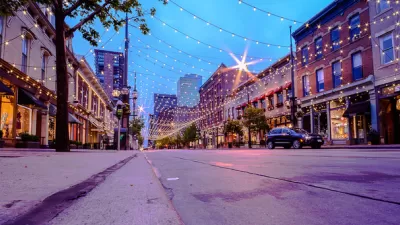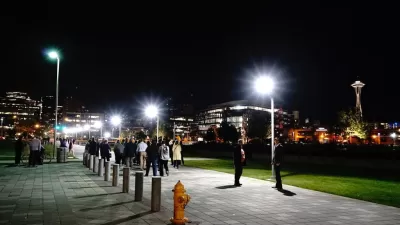Examining both sides of a debate about whether the urban revival's high-water mark is visible in the restaurant sector.

Alan Erenhalt writes a provocative article, concerned with the "limits of café urbanism." After noting that "[i]n many comeback neighborhoods, it’s a reasonable estimate that locally owned restaurants are responsible for at least three-quarters of the resurgence," Erenhalt looks for, and finds, evidence that the momentum supplied by restaurants might be starting to "peter out."
In 2016, according to one reputable study, the number of independently owned restaurants in the United States -- especially the relatively pricey ones that represent the core of café urbanism -- declined by about 3 percent after years of steady growth. The remaining ones were reporting a decline in business from a comparable month in the previous year.
Erenhalt also find anecdotal evidence to support those claims in the Clarendon district in Arlington, Virginia.
Enter Joe Cortright into the debate, countering with Erenhalt's conclusions along two lines of thinking. The first is that "café urbanism" assigns too much power to restaurants as drivers of urban revival. Second, Cortright explains, "the data clearly show that the restaurant business continues to expand. If anything, nationally, we’re in the midst of a continuing and historic boom in eating out." The central question of this debate, for Cortright, is whether the country is moving toward an "experience economy." He sees reason to believe the country is still developing as an experience economy, and urban eateries will continue to increase.
FULL STORY: The Limits of Café Urbanism

Planetizen Federal Action Tracker
A weekly monitor of how Trump’s orders and actions are impacting planners and planning in America.

Maui's Vacation Rental Debate Turns Ugly
Verbal attacks, misinformation campaigns and fistfights plague a high-stakes debate to convert thousands of vacation rentals into long-term housing.

Cuomo Is the Candidate of Both NIMBYs and Developers. What Gives?
In the New York City mayoral race, odd bedfellows align to preserve the housing status quo.

The Subversive Car-Free Guide to Trump's Great American Road Trip
Car-free ways to access Chicagoland’s best tourist attractions.

San Antonio and Austin are Fusing Into one Massive Megaregion
The region spanning the two central Texas cities is growing fast, posing challenges for local infrastructure and water supplies.

Charlottesville Temporarily Has No Zoning Code
A judge ordered the Virginia city to throw out its newly revised zoning code, leaving permitting for new development in legal limbo.
Urban Design for Planners 1: Software Tools
This six-course series explores essential urban design concepts using open source software and equips planners with the tools they need to participate fully in the urban design process.
Planning for Universal Design
Learn the tools for implementing Universal Design in planning regulations.
Heyer Gruel & Associates PA
JM Goldson LLC
Custer County Colorado
City of Camden Redevelopment Agency
City of Astoria
Transportation Research & Education Center (TREC) at Portland State University
Jefferson Parish Government
Camden Redevelopment Agency
City of Claremont





























